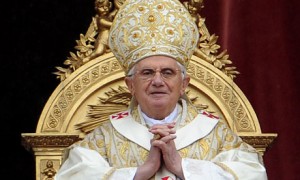 Brendan O’Neill (atheist, former altar boy) looks at the pope’s resignation and is none too impressed:
Brendan O’Neill (atheist, former altar boy) looks at the pope’s resignation and is none too impressed:
Benedict is aware of the crisis of vocation in the modern world, the way in which he what he called the ‘relativist cultural context… adversely affects the formation of consistent and stable vocational figures’ – that is, how modern society’s cult of the narrow self eats away at old notions of sacrificing oneself to a greater cause. Indeed, a couple of years ago he got his cardinals to warn against the ‘transformation of the priesthood into a profession’ and to remind people that actually it is a ‘lifelong vocation’. Yet now he has sent out the message that even being pope is kind of a profession, something one can retire from when exhausted or ill or in need of some ‘me time’.
For my part, I wish Benedict a peaceful retirement, but there’s much that I won’t miss about this pope, including his “Nazi” smears, his corporatist blather about the wickedness of “unregulated financial capitalism” and his sanctimonious greenery.

I wonder a bit … I suspect Benedict is going to carry the can for an awful lot of pediphilia and other recent sexual abuses within the church — accusations apt to be particularly loud as long as he is alive. The flip side is that while Benedict is being loudly damned (and possibly indicted) for all these past sins, the incoming Pope will start off with a clean slate.
I read the whole article, and do get the point, although I’ve never been any sort of Christian, and couldn’t care less about “vocation” in the religious sense. I can see that the traditional approach would just be for the Pope to delegate anything he absolutely cannot handle (he must delegate a lot anyway) and hang on in the office until he dies.
On the other hand, could it not also be seen as a humble and self sacrificing thing for him to recognize his current incapacity and pass the job on to someone who can handle it? Correct me if I’m wrong, but even after his resignation, won’t he still be a priest at some level? Won’t he be able to serve as a priest a some level? Do we know that he does not intend to do so?
I don’t think Benedict’s retirement is inconsistent with his “the priesthood is a vocation, not a profession” stance. There has long been a retirement age of 75 for priests and bishops and 80 for cardinals. Simply accepting that at a certain age one can no longer be expected to be productive is quite different from, say, deciding at 45 that one would really rather be an architect (and married) than be a priest.
I think Nemo is right, although I would phrase it a bit differently. In Catholic theology, an ordained person is always an ordained person — once one becomes a deacon, a priest, or a bishop, one is always those things (even if publicly defrocked, the character of ordination remains — one may be prohibited from exercising one’s vocation, but the vocation remains). But the job of a deacon, priest or bishop is different. Working as a pastor in a parish, for example, is something that a priest can retire from or be fired from. Same with a bishop. One can case to be the bishop of a particular place, while remaining a bishop in the Church. One just looses his jurisdiction and power as bishop of a particular place.
And that is essentially what the Pope is doing. For all the titles and such, the Pope’s basis of authority in the Church is his position as bishop of Rome. That is what he is resigning. He won’t lose his status as a bishop — once a bishop always a bishop — but he will lose his position as the bishop of a particular place — Rome. That’s what he is giving up. His episcopal vocation remains.
Seems pretty responsible to quit rather than be doddering and incoherent. I think it is to his credit that he chooses to resign. There is nothing magical about his being pope. He was elected like any CEO. Now he is not up to the job due to the normal effects of aging.